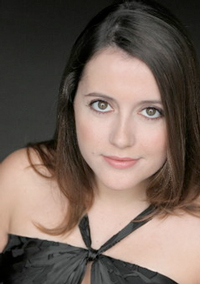by Daniel Hathaway

The New York native started out at Vassar College as a marine biology major, then switched to music and went on to pursue a graduate degree in vocal performance at the New England Conservatory. Turned down for NEC’s opera workshop, Forsythe went in search of other singing opportunities and found herself cast in a performance of a Cavalli opera at Harvard, where she met her husband-to-be, conductor and University Organist Edward Elwyn Jones, as well as Boston Baroque director Martin Pearlman.
That launched her extensive career in early music, but before long, she branched out into standard opera roles, making her European debut in Il viaggio a Reims at the Rossini Festival in Pesaro, Italy and recently appearing in Robert Carsens’s new production of Falstaff at Covent Garden. “It’s fun to do the standard roles,” Forsythe told us phone from Boston. “With early music, you might learn a role and never see the piece again!”
Not so perhaps with Handel’s opera Teseo. Forsythe had just returned the day before from singing three performances of its title role with Nicholas McGegan’s Philharmonia Baroque in Berkeley, California. The New York Times caught one of the shows and wrote “Ms. Forsythe sang the part of Teseo with a vibrant and focused soprano that brought out a likable mixture of military courage and emotional vulnerability in the young hero. Her opening aria, “Quanto ch’a me sian care,” was beautifully sung, with a slender, gleaming sound.” “That review was a big surprise,” Forsythe said, “and it made my parents very happy.”
“Teseo was the revival of a production that was staged two years ago in Göttingen. They used five of the original six cast members and swapped me into the very low title role. I tried to butch it up as much as I could. There were three different venues. At First Congregational Church in Berkeley, where the Philharmonia usually plays, they put two flutists and David Tayler, the theorbist, onstage and used only continuo for the repeat of some of the gentle da capo arias. It was my first time working with Tayler and McGegan, and it was a real treat.”
How does Amanda Forsythe feel about all of those repetitive arias in baroque opera? “They’re my bread and butter and a chance to show yourself. I enjoy writing ornaments for the repeats. I know lots of people find them tiring, but I think a good singer can make them interesting.”
Apollo’s Fire audiences will hear Amanda Forsythe sing several of those da capo arias this weekend. “Jeannette (Sorrell) wanted the program to be mostly from operas, so we’re doing an aria from Haydn’s l’Isola disabitata — a very simple, pretty piece — and arias from Mozart’s Lucio Silla — with crazy coloratura all over the place and about an octave higher than Teseo! Then we’ll do the Alleluia from Exsultate, Jubilate, just as an encore, if needed.” (Audience take note!)
Back to those “take it from the top again” arias: Forsythe also finds them useful if she’s required to sing a role — like Teseo — that doesn’t naturally fit her voice. “I made good use of those da capos in California, ornamenting them as high as possible just to keep my voice limber!”
After her gigs with Apollo’s Fire, the next big project is Handel’s very first opera, Almira, at the Boston Early Music Festival. “It’s really interesting: the recitatives are in German and half the arias are in Italian and the other half in German. There’s lots of text and it lies really high, but thankfully we’re doing it at A=392 — a whole step down from standard pitch.”
After that, Forsythe will return to Pesaro to sing William Tell at the Rossini Festival with Juan Diego Flores “in a production by Graham Vick, who did the controversial staging of Moses in Egypt last summer.” We talk a bit about unusual things European directors sometimes ask singers to do. “I haven’t had to do anything really strange, just a fair amount of singing while lying down, which seems to be in vogue just now. I’d love to just stand and deliver, but at my level in my career, I’m just trying to please everyone!”
Juggling that operatic and early music career as the mother of a three-year-old and a 16-month old is not an easy task. “I took a little more time off with George, but Henry was ten weeks old when I made my debut at Covent Garden. It’s a good thing that Ed has lots of flexibility in his schedule. And I have a lot of help.”
Published on ClevelandClassical.com April 23, 2013
Click here for a printable version of this article.



